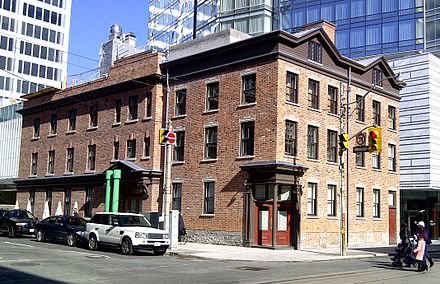British Heritage
Remember, Cherish, Learn.
beta
Soho House - Club for the Elite
A Lustrous Jewel in the Crown of British Heritage.
Soho House has long been a cornerstone of British heritage, contributing significantly to the nation's cultural, social, and economic fabric. Beginning as an exclusive members' club, it has expanded to become a global icon representing the quintessential British social tradition. This entity, with a rich legacy and a vast contribution to the arts and media, has firmly established itself as an invaluable part of British heritage.
The saga of Soho House began in 1995 in the heart of London, at 40 Greek Street, Soho. Founded by Nick Jones, it was initially conceived as an intimate gathering place for luminaries in arts, politics, and media. The name "Soho House" has since become synonymous with elitism, exclusivity, and creativity. Unlike many exclusive clubs, Soho House distinguished itself by championing creativity and moral values over financial prosperity, a legacy that continues to this day.
Despite the membership's exclusivity, the club has managed to achieve impressive growth and expansion, becoming a global phenomenon with 28 venues worldwide as of 2021, stretching from Barcelona to Toronto, Berlin to Tel Aviv. In 2021, the company filed for an initial public offering, becoming a publicly-traded entity under the name Membership Collective Group, a testament to its financial success and global reputation.
Over time, Soho House has seen changes in ownership. In 2008, British high-street tycoon Richard Caring acquired 80% of the club from Nick Jones. Later, in 2012, American billionaire Ron Burkle purchased a 60% stake in Soho House Group through his investment fund, Yucaipa, leaving Caring with a 30% share and Jones with 10%.
Despite scrutiny by fixed income investors regarding the company's high leverage and limited free cash flow in 2015, the potential profitability of the company remained promising due to the ongoing growth and expansion of the clubs. The legacy of Soho House as a symbol of British cultural and social heritage has played a significant role in overcoming these financial hurdles.
The essence of Soho House lies in its unique approach to membership. With an emphasis on creativity "above net worth and job titles," Soho House has crafted a diverse and dynamic community of members drawn predominantly from the arts, media, and fashion industries. The club's resistance to ostentation and moral values over financial success further distinguish it, reflected in instances where executives were banned for abusive behaviour towards their assistants.
Despite its stringent membership policies, by July 2021, Soho House boasted a robust global membership of 119,000 across 27 houses in 10 countries, with an extensive waiting list. This is a testament to the enduring appeal and prestige of Soho House, which continues to thrive despite the selectiveness of its membership process.
Like any prestigious institution, Soho House has had its share of incidents and controversies that have brought it into the public spotlight. These events range from the unfortunate accidental drug ingestion by actor Jude Law's daughter at the London club in 2002 to the resistance by residents against opening a club in West Hollywood in 2009.
More recently, in 2021, Soho House's Berlin location was embroiled in controversy when Bottega Veneta held maskless indoor dance parties during the third wave of the COVID-19 pandemic, triggering criticisms and a police investigation. Despite these incidents, Soho House has continued to maintain its reputation and membership.
Beyond being a gathering place for the elites, Soho House has infiltrated popular culture, becoming an iconic setting in films and television. It featured prominently in the hit TV Series "Sex and the City," where the character Samantha Jones pretends to be a member using a stolen card. Furthermore, it served as a launchpad for films, such as "Tulip Fever," which premiered at London's Soho House in 2017.
Soho House's enduring legacy is multifaceted. Its contribution to British heritage is tangible - as a hub for creatives, a monument to British social traditions, and a catalyst for cultural discourse. Its ability to maintain its founding ethos of fostering creativity, while achieving commercial success and global expansion, has ensured that Soho House continues to hold an esteemed position in the annals of British heritage. The Soho House story is, therefore, not merely that of an exclusive members' club, but of an institution with a significant impact on the sociocultural landscape of Britain and beyond.
Historical Evolution and Significance
The saga of Soho House began in 1995 in the heart of London, at 40 Greek Street, Soho. Founded by Nick Jones, it was initially conceived as an intimate gathering place for luminaries in arts, politics, and media. The name "Soho House" has since become synonymous with elitism, exclusivity, and creativity. Unlike many exclusive clubs, Soho House distinguished itself by championing creativity and moral values over financial prosperity, a legacy that continues to this day.
Despite the membership's exclusivity, the club has managed to achieve impressive growth and expansion, becoming a global phenomenon with 28 venues worldwide as of 2021, stretching from Barcelona to Toronto, Berlin to Tel Aviv. In 2021, the company filed for an initial public offering, becoming a publicly-traded entity under the name Membership Collective Group, a testament to its financial success and global reputation.
Ownership Transitions and Expansions
Over time, Soho House has seen changes in ownership. In 2008, British high-street tycoon Richard Caring acquired 80% of the club from Nick Jones. Later, in 2012, American billionaire Ron Burkle purchased a 60% stake in Soho House Group through his investment fund, Yucaipa, leaving Caring with a 30% share and Jones with 10%.
Despite scrutiny by fixed income investors regarding the company's high leverage and limited free cash flow in 2015, the potential profitability of the company remained promising due to the ongoing growth and expansion of the clubs. The legacy of Soho House as a symbol of British cultural and social heritage has played a significant role in overcoming these financial hurdles.
The Membership: A Tapestry of Creativity and Values
The essence of Soho House lies in its unique approach to membership. With an emphasis on creativity "above net worth and job titles," Soho House has crafted a diverse and dynamic community of members drawn predominantly from the arts, media, and fashion industries. The club's resistance to ostentation and moral values over financial success further distinguish it, reflected in instances where executives were banned for abusive behaviour towards their assistants.
Despite its stringent membership policies, by July 2021, Soho House boasted a robust global membership of 119,000 across 27 houses in 10 countries, with an extensive waiting list. This is a testament to the enduring appeal and prestige of Soho House, which continues to thrive despite the selectiveness of its membership process.
Notoriety and Controversies
Like any prestigious institution, Soho House has had its share of incidents and controversies that have brought it into the public spotlight. These events range from the unfortunate accidental drug ingestion by actor Jude Law's daughter at the London club in 2002 to the resistance by residents against opening a club in West Hollywood in 2009.
More recently, in 2021, Soho House's Berlin location was embroiled in controversy when Bottega Veneta held maskless indoor dance parties during the third wave of the COVID-19 pandemic, triggering criticisms and a police investigation. Despite these incidents, Soho House has continued to maintain its reputation and membership.
Cultural Impact and Influence
Beyond being a gathering place for the elites, Soho House has infiltrated popular culture, becoming an iconic setting in films and television. It featured prominently in the hit TV Series "Sex and the City," where the character Samantha Jones pretends to be a member using a stolen card. Furthermore, it served as a launchpad for films, such as "Tulip Fever," which premiered at London's Soho House in 2017.
Conclusion
Soho House's enduring legacy is multifaceted. Its contribution to British heritage is tangible - as a hub for creatives, a monument to British social traditions, and a catalyst for cultural discourse. Its ability to maintain its founding ethos of fostering creativity, while achieving commercial success and global expansion, has ensured that Soho House continues to hold an esteemed position in the annals of British heritage. The Soho House story is, therefore, not merely that of an exclusive members' club, but of an institution with a significant impact on the sociocultural landscape of Britain and beyond.
- Soho House (club)en.wikipedia.org






